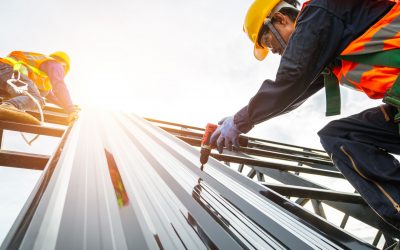When we think about protecting our homes, we often focus on the interior—appliances, heating and cooling, flooring, and insulation. But there’s one critical component that often gets overlooked: the roof. Specifically, roof coating can be a game-changer when it comes to extending the life of your roof and improving energy efficiency.
If your roof is starting to show signs of wear but isn’t quite ready for a full replacement, applying a roof coating could be the perfect solution. But what exactly is it? When should you consider it? And what are the different types available?
This guide breaks it all down in plain language, helping homeowners and property managers make smart, informed decisions.
What Is a Roof Coating?
A roof coating is a protective layer applied to the surface of a roof to extend its life, seal leaks, improve reflectivity, and enhance energy efficiency. Think of it as a “shield” that adds an extra barrier between your roof and the elements—sun, wind, rain, and even UV rays.
Unlike a full roof replacement, which involves tearing off and installing new materials, a coating is applied directly to the existing surface. This makes it a faster, less invasive, and often more affordable option for improving your roof’s performance.
Key Benefits of Roof Coating
Isn’t just about aesthetics—it delivers several practical and cost-saving benefits:
1. Extended Roof Life
One of the most attractive benefits of roof coating is its ability to extend the life of your existing roof. A properly applied coating can add 5–15 years or more to your roof’s service life, delaying the need for costly replacements.
2. Improved Energy Efficiency
Reflective coatings, often referred to as “cool roof coatings”—help deflect sunlight and reduce heat absorption. This means your building stays cooler in the summer, which can significantly lower air conditioning costs.
3. Leak Prevention
Roof coatings help seal minor cracks, seams, and areas of deterioration. While they won’t fix major structural issues, they can effectively stop or prevent small leaks and water infiltration.
4. UV Protection
Over time, UV radiation from the sun can cause roofing materials to degrade. Roof coating provides a layer of UV protection, reducing wear and slowing down the aging process.
5. Eco-Friendly
By extending your roof’s lifespan and improving energy efficiency, you’re reducing landfill waste and energy consumption. Plus, many modern coatings are formulated with environmentally friendly materials.
Common Types of Roof Coating
There’s no one-size-fits-all solution when it comes to roof coating. The right choice depends on your roof type, environment, and desired benefits. Here are the four most common types:
1. Acrylic Roof Coating
Acrylic coatings are water-based and ideal for high UV environments. They offer excellent reflectivity and are commonly used on sloped roofs. However, they may not perform as well in ponding water conditions.
2. Silicone Roof Coating
Silicone coatings are moisture-cured and offer excellent resistance to ponding water, making them ideal for flat or low-slope roofs. They are also highly UV-resistant but can be slippery when wet.
3. Polyurethane Roof Coating
Polyurethane coatings are more impact-resistant than other options, making them suitable for high-traffic or hail-prone areas. They’re often used in industrial settings or on roofs that require added durability.
4. Asphalt-Based Coating
These are commonly used on built-up or modified bitumen roofs. Asphalt coatings provide good waterproofing but are typically less reflective than other types.
When Should You Apply a Roof Coating?
Timing is everything when it comes to roof coating. Here are a few signs it might be time to consider this upgrade:
- Your roof is aging but still structurally sound.
- You’re noticing higher energy bills in summer.
- There are small leaks or minor surface cracks.
- You want to prolong the life of your current roof without replacing it.
Generally, a roof should be cleaned, repaired (if needed), and fully dry before a coating is applied. Spring and fall are often ideal times, as weather conditions are more predictable and temperatures are moderate.
How Long Does it Last?
Depending on the type of coating, installation quality, and environmental conditions, a roof coating can last anywhere from 5 to 20 years. Regular maintenance, including inspections and cleaning, can help extend its lifespan further.
When it nears the end of its lifecycle, many coatings can be re-coated rather than removed, offering a cost-effective renewal process.
Things to Consider Before Applying Roof Coating
Before jumping into a roof coating project, keep these considerations in mind:
- Roof Condition: Coating isn’t a magic fix. If your roof is severely damaged or has underlying structural issues, a full replacement may be necessary.
- Surface Compatibility: Some coatings don’t adhere well to certain materials. Make sure the product you choose is compatible with your existing roof.
- Professional Application: While some DIY options exist, professional installation ensures proper surface prep and long-term performance.
- Local Climate: Choose a roof coating that aligns with your area’s climate conditions, especially regarding UV exposure and precipitation.
Is Roof Coating Right for You?
If your roof is in decent shape and you’re looking to extend its life, improve energy efficiency, and avoid a full tear-off, roof coating might be exactly what you need. It’s especially popular among homeowners, commercial building owners, and facilities managers looking to make smart, sustainable decisions.
Of course, every building is different. An inspection from a professional roofing contractor can help determine if your roof is a good candidate for coating.
Need Expert Help?
At Quick Roofing, we have been helping homeowners and businesses maintain strong, long-lasting roofs for over 35 years. If you’re considering roof coating or simply want a professional opinion on your roof condition, our experienced team is ready to assist. Contact Quick Roofing to learn more or schedule a consultation.



